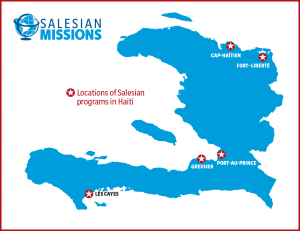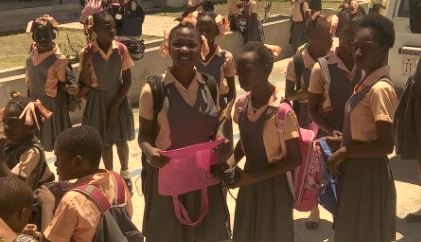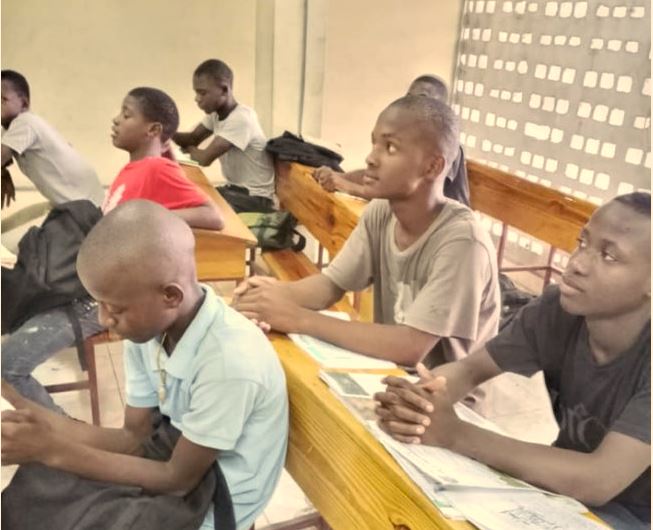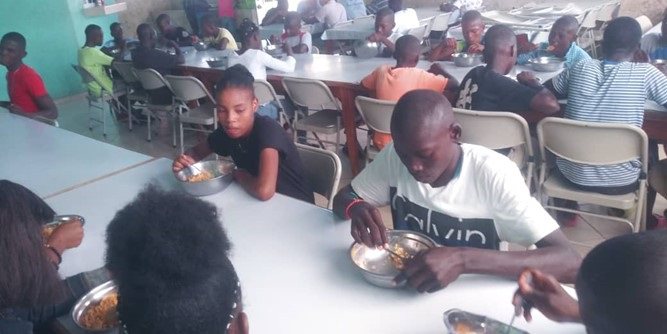HAITI: Salesian Missionaries Provide Education, Social Welfare Programs for More Than 25,000 Youth
(MissionNewswire) The Salesians of Don Bosco began working in Haiti in 1935 in response to the Haitian government’s request for a professional school. Since then, Salesian missionaries have expanded their work to include 10 main educational centers and more than 200 schools across the country. The primary 10 centers each have a number of primary and secondary schools, vocational training centers and other programs for street children and youth in need. Salesian programs are located throughout Haiti, including in the cities of Port-au-Prince, Fort-Liberté, Cap-Haïtien, Gonaïves, Gressier and in Les Cayes (the area hardest hit by the Hurricane Matthew).
 Today, Salesian missionaries in Haiti are the largest source of education outside of the Haitian government, and their programs serve more than 25,000 Haitian children. Salesian-run technical and vocational training centers focus on providing youth with the educational opportunities and social support they need to succeed.Those in Port-au-Prince and its surrounding villages offer courses in a variety of professional fields such as catering, woodworking, agriculture, electricity, mechanics and hotel management. Additional centers in Fort-Liberté and Cap-Haïtien specialize in the fields of health, agriculture, information technology, electricity and hotel management.
Today, Salesian missionaries in Haiti are the largest source of education outside of the Haitian government, and their programs serve more than 25,000 Haitian children. Salesian-run technical and vocational training centers focus on providing youth with the educational opportunities and social support they need to succeed.Those in Port-au-Prince and its surrounding villages offer courses in a variety of professional fields such as catering, woodworking, agriculture, electricity, mechanics and hotel management. Additional centers in Fort-Liberté and Cap-Haïtien specialize in the fields of health, agriculture, information technology, electricity and hotel management.
In 2015, nine new classrooms were built in the impoverished village of Bergeaud, located in the southwest seaport city of Les Cayes. Here, Salesian missionaries run a vocational training center for youth. The new classrooms are part of a new school serving hundreds of students in the area.
“Salesian schools in Haiti fulfill an important socio-economic mission by providing poor youth a foundation for lifelong learning through education and training in skills and trades to help them escape poverty and establish a sustainable livelihood,” says Father Mark Hyde, executive director of Salesian Missions, the U.S development arm of the Salesians of Don Bosco. “We are constantly looking for ways to improve education and workforce development for youth, and we accomplish this by improving the skill and capacity of professionals in existing programs and helping graduates overcome obstacles to entering the workforce.”
In addition to the vocation and technical education, Salesian missionaries operate 192 primary schools and three vocational/technical schools known as OPEPB (in French: Oeuvre des petites écoles du Père Bohnen) or the Little Schools of Fr. Bohnen, in honor of its founder, in Port-au-Prince. Today, OPEPB is committed to working for the improved social welfare of more than 7,000 marginalized youth.
Further, Salesian Missions has been collaborating with Salesian missionaries in Haiti for more than 20 years, during which time hundreds of containers of donated goods have been sent to meet the needs of youth advancement programs. These shipments have included food items to feed the school children and youth center attendees, educational books and computers for the schools and youth centers, clothing for the children and hygiene supplies for cholera prevention.
In the past few years, Salesian Missions has partnered with a number of organizations that make these shipments possible including Feed My Starving Children, Stop Hunger Now, One World Play Project, Cross International, Mission Relief Services, the Order of Malta, Kids to Kids International, the Institution Recycling Network and Relief International, among others. Salesian missionaries have the infrastructure in place to ensure that these donations reach those who need it most.
Because Salesian missionaries live and work in these local communities they are also among the first to respond when disaster strikes. Salesian missionaries were among the first responders to the January 2010 earthquake that destroyed 90 percent of Haiti’s schools and 60 percent of hospitals, killed thousands of people and left more than 350,000 injured.
After the 2010 earthquake, Salesian Missions in New York worked in cooperation with the Salesian-run Rinaldi Foundation, which headed up Salesian relief and reconstruction efforts in Haiti. The experience both the Rinaldi Foundation and Salesian Missions gained from this work is invaluable at times like this. Not only are Salesian missionaries often called upon by the government to assist, their programs are trusted by locals who know it is a place to turn during emergencies. Infrastructure and logistical capabilities (such as storage warehouses, transportation and distribution channels) allow Salesian Missions to provide assistance during times like this. Additionally, partnerships are key to effectively respond to humanitarian needs during emergencies such as this. Salesian Missions works with organizations within Haiti, in the United States and around the globe, and therefore has access to the supplies needed.
Currently, Salesian Missions, the Rinaldi Foundation and Salesian missionaries in Haiti are actively assessing and responding to the needs of those affected by Hurricane Matthew. The Rinaldi Foundation’s experienced Planning Development Office is heading up the relief effort in Haiti.
Despite ongoing reconstruction and infrastructure improvements, Haiti remains the poorest country in the Americas and one of the poorest in the world. According to the World Bank, over half of the country’s population of 10 million lives on less than $1 per day and approximately 80 percent live on less than $2 per day. The majority of Haitians lack adequate access to education, healthcare and nutritious food.
In the wake of Hurricane Matthew, Salesian Missions launched an emergency appeal to raise funds to help purchase relief supplies: https://www.salesianmissions.org/haiti-relief/give
###
Sources:
Salesian Missions – Haiti
World Bank – Haiti




